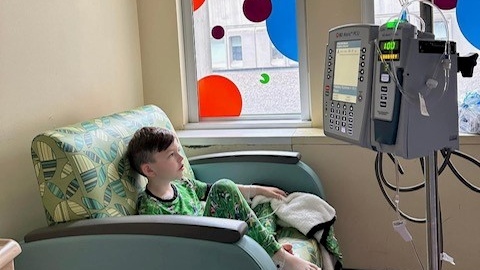An Ontario mother said it looked like a horror movie when she flicked on the lights of her son’s bedroom to find him projectile vomiting blood after his tonsils were removed at McMaster Children’s Hospital.
“This was the scariest thing I had ever seen in my life,” Donna Hamilton, the mother of the then five-year-old Hank, said recalling her son’s tonsillectomy in April 2023.
The common surgical procedure, in which the tonsils are removed, often treats repeated infections and sleep-related breathing issues. The procedure varies in necessity, depending on the patient’s condition.
Like all surgical procedures, tonsillectomies come with risks of complications, but in the wake of two children’s deaths after the procedure, some parents have questioned its necessity.
“Why did I have this surgery? Why did I put his life in danger?”
According to Dr. Sam Daniel, Surgeon-in-Chief of Montreal Children’s Hospital, the decision to move forward with the procedure is ultimately tied to the impact the condition has on a child’s quality of life.
Hank’s tonsils were removed to help with sleep apnea and mucus in his nose disrupting his breathing. Seven days after his surgery, he started eating solid food, which Hamilton took as a good sign.
 Hank has recovered from the emergency last year, but his mother said the procedure hasn’t helped his mucus and sleep issues.
Hank has recovered from the emergency last year, but his mother said the procedure hasn’t helped his mucus and sleep issues.
But that night, at around 10:30 p.m., blood began pouring out of the surgical site. He was rushed to the emergency room, where he stayed for several days recovering from the bleed.
“If I had known this was a [possibility], I would have never done the surgery – even a one per cent [chance],” Hamilton said.
Before her son underwent the procedure, Hamilton signed paperwork with the hospital, acknowledging the risks of the surgery. While the form outlined that post-surgical bleeding is observed in about five per cent of cases, Hamilton said she didn’t realize the extent of the possibility.
A year later, the procedure hasn’t garnered the desired results for Hank, according to his mother. Hank still had mucus and sleep issues, Hamilton said. His surgeon recommended a daily nose spray.
“It didn’t fix anything,” she said.
 Donna Hamilton’s son Hank recovering at McMaster Children’s Hospital after he was rushed to the hospital a year ago, seven days after his tonsils were removed.
Donna Hamilton’s son Hank recovering at McMaster Children’s Hospital after he was rushed to the hospital a year ago, seven days after his tonsils were removed.
On June 4, McMaster Children’s Hospital paused tonsil and adenoid surgeries for children under 18 years old following the tragic deaths of two pediatric patients.
The hospital called the events “tragic” and “very rare,” emphasizing that there was no apparent connection between the two fatalities, and that a comprehensive review of the pediatric program was underway.
“When we hear the news, tragic events are highlighted, but thankfully [they are] very rare. It’s a one in 20,000 to a one in 100,000 [chance], depending on various studies,” Daniel, the Montreal chief surgeon, said.
There are times when the indications are clear and the risks of not doing the surgery are harmful to the child, Daniel said.
Other times, it’s less clear cut. If a child’s tonsils are so large that a kid can’t swallow food, or their sleep-disordered breathing impacts behaviour and development, that would leave a heavy imprint on the child’s quality of life, Daniel said.
But if a child has an occasional infection, guidelines suggest waiting to see if they have more than seven occurrences in a year before considering an operation.
The American Academy of Otolaryngology–Head and Neck Surgery, which is also a leading reference in Canada, updated its guidelines in 2019. Among the updates, a panel of physicians recommended improving the counseling and education of families who are considering a tonsillectomy.
“It starts with an honest conversation with the surgeon and the treatment team […] and always keeping in mind what’s best for the child,” Daniel said.